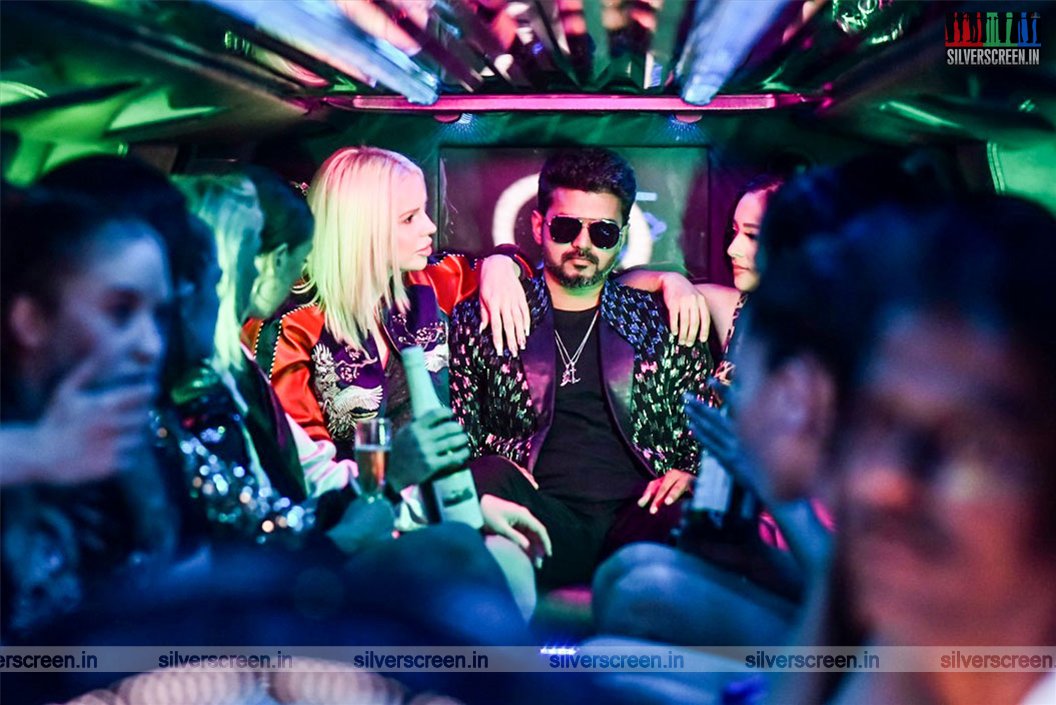Director: Mari Selvaraj
Cast: Kathir, Anandhi, Yogi Babu
Composer: Santhosh Narayanan
For Pariyerum Perumal to have achieved the kind of welcome it has, there needed to be a canvas as small and intimate to strike an instant kinship – a village off Thoothukudi where the land is parched, everyone knows everyone, and a shallow brown pool of water is a source of much happiness. Also, a canvas malleable enough to allow room for themes or threads not exactly diverse, but that don’t directly influence the proceedings either. For instance, the film, which is primarily constructed as a coming-of-age tale set against violent caste politics, through the eyes of a young man who has a brutal awakening of his identity, does more than just follow him around. There are vignettes, telling glimpses of cultural and social practices that form the spine of the tale, and by extension, give form to the landscape that the filmmaker intends to show.
The first few moments are a prelude to what’s to come: A dog – a black one beautifully named Karuppi – is killed in a display of caste power. Her death is mourned in song and dance – alternatively sombre and upbeat – a Pa Ranjith influence. It’s here that Mari Selvaraj establishes the tone of Pariyerum Perumal – places and faces, where and to whom caste could mean life …or the loss of it. The nature of death – slow or instant – depends ironically on the measure of privilege (if any) a person has – and their circumstances. During an instance towards the climax of the film, a young woman weeps as her head is being tonsured; as the old hairdresser removes one clump of hair after another, he consoles her, it’s for your father’s well-being after all, he says soothingly. Before you could wonder at the odd reasoning, the real one emerges: to deter a budding romance. The requirements of the hairdresser’s clients soon become increasingly sinister. The next one wants someone’s head.
Pariyerum Perumal is layered as only a film with raw, powerful ambition to showcase brutal societal realities can be. It wages a war on many fronts: Caste hegemony, identity politics, the education circus and the treatment of gender minorities (a crucial subplot is inspired from the director’s life). Karuppi, the dog, is the symbol of the oppressed – the films opens with her: A being without a voice, and whose barks are loud enough to be heard, but not be saved, someone whose story is told only after death. Pariyan (Kathir), who cared for her, is a carefree youth when we meet him; not exactly unaware of his identity, but not quite aware of the caste power dynamics at large. He wears an easy smile, and betrays an infectious enthusiasm. During the law school interview, when the principal wants to know his ambitions, he says he wants to become a doctor. Here, Selvaraj lets the feeling of bemusement settle in before letting Pariyan suffix the “Dr.” with “Ambedkar”. The principal tells the peon to make note of him. Just in case he causes trouble, he says.
Mari Selvaraj deftly weaves in the flaws in the way education is structured and disseminated in the country: Pariyan struggles to comprehend his lessons in English; and during an instance, he contemplates asking the lecturer to switch to Tamil – in vain. The director is restrained in these portions, alternating between serious questioning (the use of a seemingly alien language for educational discourse in the rural context) and laugh out loud humour. The hilarity is of course courtesy Yogi Babu whose presence cuts through the abject starkness of the script.
Much of Pariyerum Perumal’s moments are devoted to the relationship between Pariyan and Jyothi Mahalakshmi (Anandhi), a classmate who belongs to one of the upper castes. Some moments seem right out of recent reality when a Dalit youth in Telangana was killed by his father-in-law whose family belongs to the Vaishya community. Selvaraj though, makes Jyothi unaware of caste politics, forcing Pariyan to bear the brunt of their relationship – so much so that as Pariyan turns more sullen and withdrawn after a violent run-in with her family, Jyothi, by contrast, is exuberant and child-like with no social conscience whatsoever. But perhaps, that is the idea.
The post interval leg of the film is announced with a crescendo of violins that plays a singular note – something that can be visually represented by a series of straight musical lines drawn at once – signifying the intense emotions that course through Pariyan as he comprehends what’s happening to him, anger replacing disbelief. The soft piano keys that punctuate the score hint at the tumult of feeling within him; love, hate, anger, retribution. In an ironical scene, as Pariyan nurses his wounds, a man with prominent upper caste bearings, hands him a drink.
The romance is dreary in some portions, but for Pariyan, what seemed to hold much promise soon becomes an off-key, ambiguous feeling. He likes the idea of Jyothi, of being in love perhaps, but even before he could sort out his passions, they are quashed. In place of delicious stirrings of romance, there’s affection dulled by violence. In one of the later scenes, he tells Jyothi’s father that he still cannot fathom what he feels for her. Once, he had called her an angel, a devadhai, but another time, he equates her to his dead dog Karuppi.
Recommended
In Pariyerum Perumal, directed by Mari Selvaraj, whose mentors are Pa Ranjith and director Ram, there are marked influences from both. There’s the telltale Ranjith hue: A forget-me-not blue that seems nothing more than a show of solidarity at first, but later comes to acquire significance. Every person that dies of caste violence in the film is marked by blue, followed by a short burst of song – a Santhosh Narayanan staple – that infuses Pariyan with awakening, recognition and strength. Snakes, scorpions and other venomous creatures dot the canvas – and suddenly, the blue makes sense. Later though, when Pariyan is in mortal danger, and is nudged to life by Karuppi in spirit, the blue makes an appearance again. This time, Karuppi is awash in it – the colour of a saviour. The low-angle shots are brought out then, replete with a background score usually reserved for a hero. In Pariyerum Perumal, it is a beautiful black dog with burning embers for eyes.
*****
The Pariyerum Perumal review is a Silverscreen original article. It was not paid for or commissioned by anyone associated with the movie. Silverscreen.in and its writers do not have any commercial relationship with movies that are reviewed on the site.



